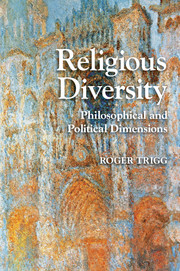Book contents
- Frontmatter
- Dedication
- Contents
- Introduction
- 1 The Challenge of Religious Diversity
- 2 Do Religions Claim Truth?
- 3 Religious Pluralism
- 4 The Roots of Religious Belief
- 5 Does Disagreement Undermine Theism?
- 6 Education and Religious Diversity
- 7 Truth and Coercion
- 8 Religious Diversity and Identity
- 9 Religion as Personal Preference
- 10 Freedom and Religion
- Bibliography
- Index
- References
8 - Religious Diversity and Identity
Published online by Cambridge University Press: 05 June 2014
- Frontmatter
- Dedication
- Contents
- Introduction
- 1 The Challenge of Religious Diversity
- 2 Do Religions Claim Truth?
- 3 Religious Pluralism
- 4 The Roots of Religious Belief
- 5 Does Disagreement Undermine Theism?
- 6 Education and Religious Diversity
- 7 Truth and Coercion
- 8 Religious Diversity and Identity
- 9 Religion as Personal Preference
- 10 Freedom and Religion
- Bibliography
- Index
- References
Summary
SOURCES OF AUTHORITY
In the previous chapter, I showed that many can feel threatened by the diversity and rapid change of modern life, even in the sphere of religious belief. Fundamentalism is one reaction to this. Paradoxically, philosophical relativism can also insulate us collectively from others by removing the possibility that there is anything to learn from them. Whatever we, and the group we belong to, believe is true for us. One sociologist comments that “when religious differences are strongly embedded in ethnic identities, the cognitive threat of the ideas of others is relatively weak.” Challenges to those beliefs from outside our own society, however defined, do not point us to a wider truth. We are more concerned with who we are than with the justification of the beliefs that help to define us and our way of life. The idea of a universal truth applying to all can be ignored, and could destabilize our society by possibly undermining the beliefs that help define it. The more objective truth is decried, the more likely it is for a premium to be placed on social cohesion. The more identity is valued, the more likely it is for concerns about truth to seem irrelevant.
The maintenance of a common identity can easily become the priority. Even if groups we think they possess important truths, their maintenance and transmission, and the preservation of the community in which they are held, can progressively appear ever more important. Issues concerning authority often loom large in religious disputes. Who has the authority to define, and to safeguard, what is supposed to be true? Saying that the authority resides in a holy text such as the Bible or the Qur'an transfers the question to who can be trusted to give the correct, or approved, interpretation of the text. Schools of interpretation can grow up, and disputes arise about who the experts are who can be trusted.
- Type
- Chapter
- Information
- Religious DiversityPhilosophical and Political Dimensions, pp. 132 - 150Publisher: Cambridge University PressPrint publication year: 2014

